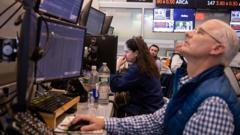US stocks have rallied significantly following President Donald Trump's unexpected decision to pause the imposition of steep tariffs on goods from numerous countries. Instead of the anticipated tariff structure, Trump proposed a 10% import tax rate for trade partners willing to engage in negotiations. However, he emphasized escalating tariffs on Chinese imports, raising them to a staggering 125% "effective immediately."
The announcement from the White House comes just shortly after a troubling week, where the S&P saw a substantial decline exceeding 10% due to heightened tariff expectations. Major trading partners, including Vietnam, faced devastating new levies, sparking concerns of economic recession both domestically and globally. By midweek, market pressures extended to the bond sector, resulting in a sell-off of US government debt as investor anxieties intensified.
Paul Ashworth, chief North America economist for Capital Economics, noted that while Trump managed to avert an immediate stock market crisis, the weakening bond market left him with diminished options. Ashworth anticipates that Trump might shift back to his originally proposed 10% universal tariff in the future, although substantial negotiations between the US and China could take time. He remarked, "It is difficult to see either side backing down in the next few days," underscoring the complex dynamics at play.
On Wednesday, the Dow surged more than 7.8%, with the Nasdaq making extraordinary gains upwards of 12%. Notable companies like Nike, which produces a significant portion of its products in Vietnam, saw an 11% increase in stock price, while Apple shares climbed by approximately 15%. Nonetheless, the major market indexes remained below their pre-announcement levels, leaving the S&P 500 down by about 3% for the year.
Concerns linger surrounding the impact of tariffs on goods imported from China, which has been a key supplier for the US economy, accounting for over $400 billion in goods in the previous year. Notably, China is responsible for a substantial portion of US apparel and footwear imports. The situation was exacerbated by the National Retail Federation's prediction of a 20% decrease in shipments handled by US ports in May compared to the previous year, directly tied to tariffs.
In subsequent comments, Trump expressed optimism about reaching a deal with China and mentioned the possibility of granting exemptions from tariffs for specific companies, diverging from his earlier hardline stance. This decision, influenced by rising political pressure from allies and business influencers, showcased the volatility of his tariff strategy.
Goldman Sachs's prediction of a potential recession looming over the US economy as a consequence of steep tariffs added to the disarray, with the bank adjusting its forecasts shortly after Trump's announcement. Well-known investor Bill Ackman welcomed Trump's decision on social media, stating, "Thank you on behalf of all Americans," reflecting a mix of relief and optimism surrounding the latest market developments.



















